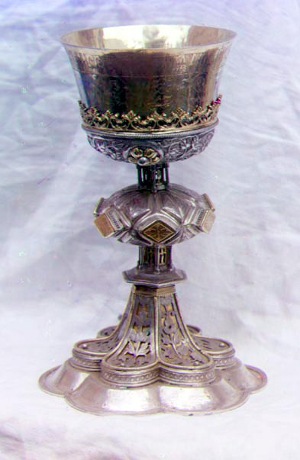Dubliners Contents
- Social / political context
- Religious / philosophical context
- Literary context
Religion
Joyce’s personal perspective
James Joyce had a complex relationship with religion. He was educated in the Jesuit order, a rigorous interpretation of Roman Catholicism. Whilst Joyce relished the intellectualism of the Jesuits and their emphasis on learning, he found religious life oppressive. In a letter to his partner, Nora Barnacle, dated 29th August 1904, Joyce wrote:
The ‘blessing’ of Dubliners
Despite Joyce’s personal objections to Catholic doctrine and practice, representations of the Christian religion are present throughout Dubliners. For example, in the same month as he wrote the above letter to Nora (August 1904), Joyce used a Christian term to describe the work which would become Dubliners, by calling the book ‘a series of epicleti’ (Letters I, 55).
 The ‘Epiclesis’ is the part of the prayer of consecration during a service of Mass / Eucharist / Holy Communion in which the Holy Spirit is called upon to bless those taking part and imbue the bread and wine with spiritual significance. For example, as one liturgy puts it:
The ‘Epiclesis’ is the part of the prayer of consecration during a service of Mass / Eucharist / Holy Communion in which the Holy Spirit is called upon to bless those taking part and imbue the bread and wine with spiritual significance. For example, as one liturgy puts it:
these gifts of bread and wine
may be to us the body and blood of our Lord Jesus Christ;
Joyce is ambiguous as to what exactly he means by asserting his stories are epicleti:
- Is he wanting to take the role of God and bless the characters of Dubliners?
- Does Joyce aim to give new (spiritual or non-spiritual) significance to Dublin and its inhabitants?
- Does he want to transform Dublin (or at least people’s perceptions of it)?
- Why use the religious term rather than a more neutral word, such as ‘transformation’?
Joyce, as ever, is keen to make his readers think for themselves.
Anti-clericalism
Joyce not only struggled with the beliefs of the Christian faith but also the way in which it was expressed in Irish society. The role of priests in local society was a dominant one and Joyce questioned their worth.
The Sisters and Grace are particularly anti-clerical, but not straightforwardly anti-religious:
- Father Flynn, in The Sisters, is perceived as an unsuccessful and fallen priest. However, he is respected – by the boy-narrator, in particular – as a spiritual educator
- Grace begins with a metaphor for the biblical fall of humankind when Mr Kernan is discovered lying unconscious, having fallen down drunk in a basement pub toilet. Kernan is found by fellow drinkers who later convince him to take up religion and give up his heavy drinking. On one level, Joyce appears to present religion as having saving power. On another level, however, he presents Irish Catholicism in this story as little more than a business. Kernan is cast as a new stakeholder, recruited to procure spiritual wealth for Cunningham, Power, M’Coy and Fogarty.